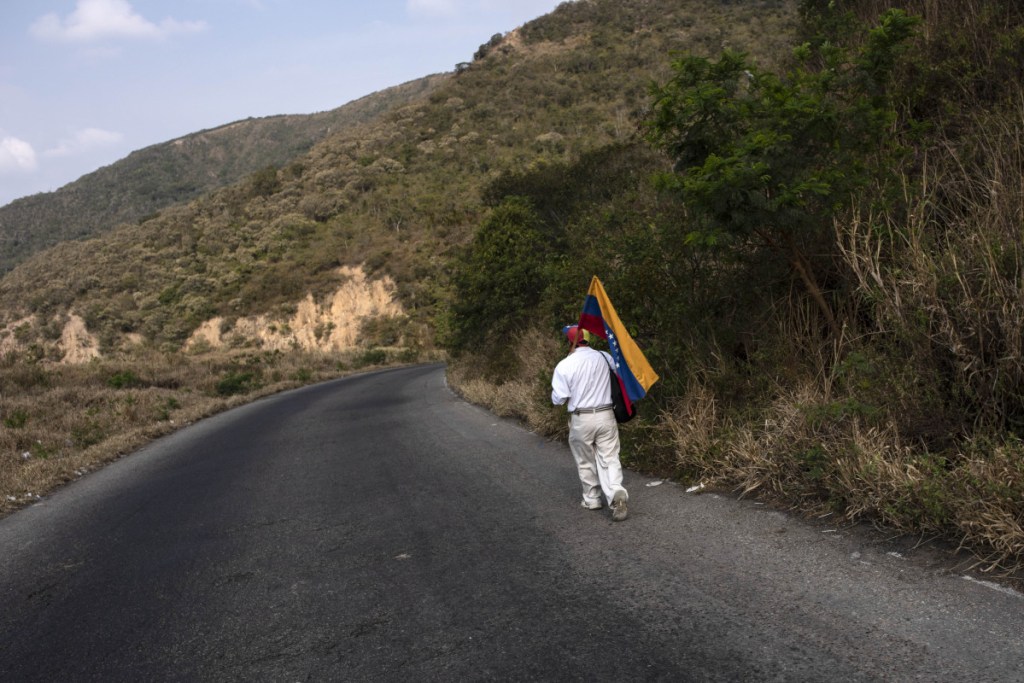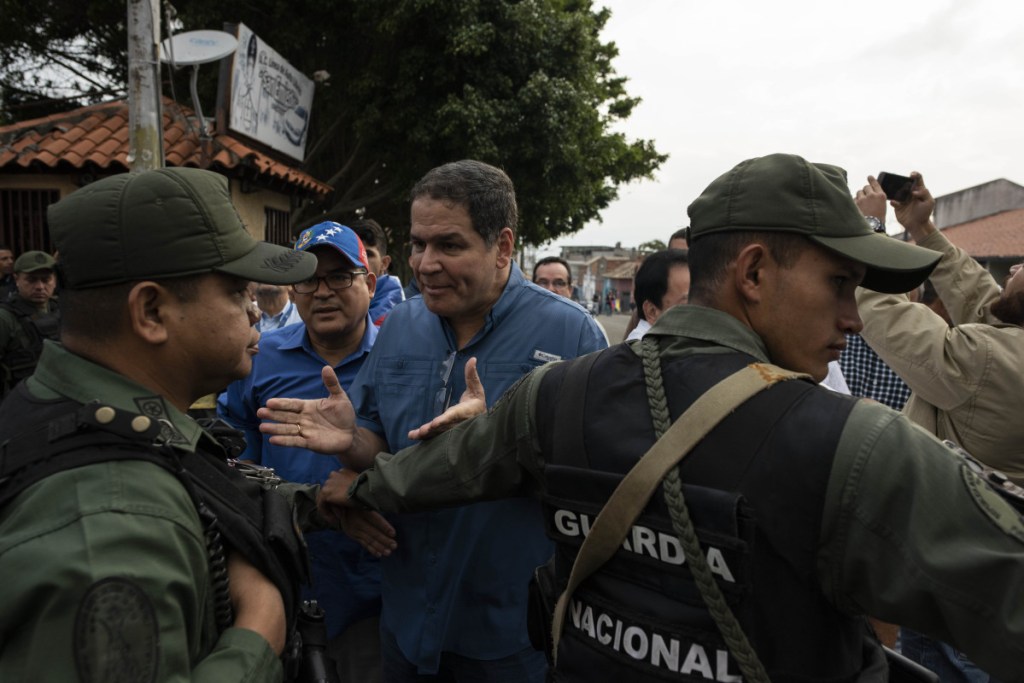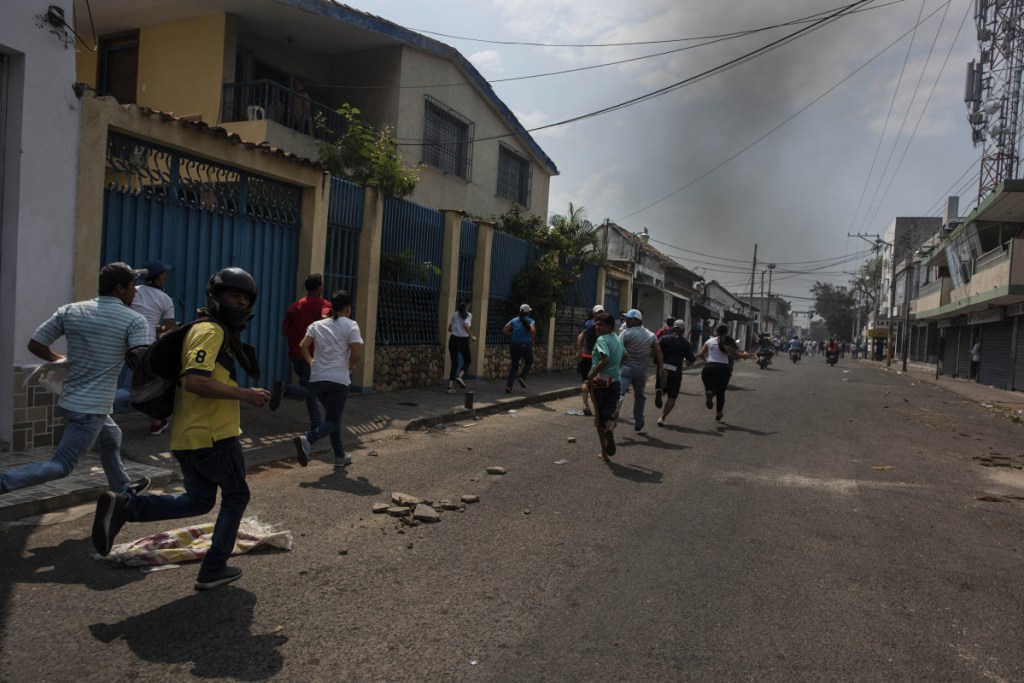CARACAS, Venezuela — For more than a month, opposition leader Juan Guaido’s audacious campaign to oust President Nicolas Maduro captivated the world while bringing hope to millions of desperate Venezuelans. But his U.S.-backed movement to unseat the socialists is at a crossroads, in danger of losing its greatest asset: momentum.
Guaido, a 35-year-old civil engineer turned national hero, staked everything on a weekend operation to break the government’s blockade of U.S. humanitarian aid and turn Maduro’s armed forces against him. That bid largely failed, producing a trickle, but not a flood, of military defections. The opposition’s next play – a call for intervention by foreign forces – did not win immediate support in Washington.
The succession of setbacks left the opposition scrambling on Tuesday to sustain what has become the single biggest challenge to 20 years of socialist rule and manage inflated expectations of a rapid ouster of Maduro.
“Some sectors of the opposition are frustrated because there was no sophisticated or alternative plan if military forces did not break over the weekend,” said Luis Vicente Leon, director of Datanalisis, a Caracas-based polling agency. “In short, their plan was naive.”
For years, the opposition to Maduro was weak and fractured. That changed when Guaido emerged as a unifying symbol. Citing the constitution, he called Maduro a usurper for claiming to win an elections that many observers had deemed fraudulent, and Guaido, as the head of the opposition-dominated National Assembly, proclaimed himself the nation’s rightful leader.
As opposition leaders held a flurry of phone calls and meetings Tuesday to assess their options, the most pressing question was whether Guaido would be able to re-enter Venezuela after leaving it over the weekend to lead the aid effort from Colombian jurisdiction and meet with regional leaders. Guaido will seek to re-enter Venezuela within the next few days, opposition officials said.
Guaido left the country in violation of a government travel ban, and his suggestion of foreign intervention could open the door to charges of treason.
He is now gambling that Maduro would not risk an international backlash by taking action against him. But analysts say there is still a high likelihood that Guaido will be arrested or barred from returning, which could leave him running a dampened movement from exile.
Guaido himself has said it is vital for him to be able to lead massive rallies and challenge Maduro from stages nationwide. Guaido still commands vast support in a country suffering from a profound collapse linked to failed socialist policies and government corruption and mismanagement.
“An imprisoned leader doesn’t serve anyone, and an exiled president doesn’t either,” Guaido said in a televised interview from Colombia on Tuesday. “My function and responsibility is to be in Caracas, no matter the risks.”
At the same time, the movement he almost single-handedly energized is confronting disappointment and deflated expectations – and is divided over whether to stay the course of peaceful disobedience or take the fight to Maduro through armed resistance.
“War is the only way to take out this government,” said Humberto Arau, 28, a student activist from the Venezuelan city of Merida who engaged in running battles with Maduro’s forces on Saturday on the Colombian border. He and other radical opposition youths were calling Tuesday for weapons to help them raise an armed insurgency.
Some militants were already assembling piles of molotov cocktails and vowing to procure weapons. The most radical protesters complained that opposition leaders had not fought hard enough Saturday, insisting that they fled to the rear when the tear gas and rubber bullets began to fly.
“We’ve got to help our people,” said 18-year-old Yoiner Jalez, an anti-government militant living in a camp in the Colombian border city of Cucuta. Even as opposition leaders called for at least a temporary halt to the effort at breaking Maduro’s blockade, Jalez said he and other militant youths were planning an attempt to take a border bridge and clear a corridor for humanitarian aid.
“All we have now are rocks, molotovs, slingshots and shields,” he said. “We need arms to continue this.”
Yet without large-scale support from the U.S. and other anti-Maduro governments, the chances of an armed insurgency remained slight at best. That is particularly true in the border region, which is a hotbed for narco-traffickers and Colombian leftist guerrillas who operate in loose alliance with Maduro’s government. Experts said it was unlikely that they would allow new actors on their turf.
“I think that this armed violent group that calls itself ‘the resistance’ – a group of Venezuelans and Colombians – won’t really be able to establish themselves there,” said Wilfredo Canizares, the director of Fundacion Progresar, a Colombian-based human rights group that monitors violence in the border zone.
The opposition is now left to play the long game as sanctions continue to squeeze Venezuela.
Copy the Story LinkSend questions/comments to the editors.





Success. Please wait for the page to reload. If the page does not reload within 5 seconds, please refresh the page.
Enter your email and password to access comments.
Hi, to comment on stories you must . This profile is in addition to your subscription and website login.
Already have a commenting profile? .
Invalid username/password.
Please check your email to confirm and complete your registration.
Only subscribers are eligible to post comments. Please subscribe or login first for digital access. Here’s why.
Use the form below to reset your password. When you've submitted your account email, we will send an email with a reset code.